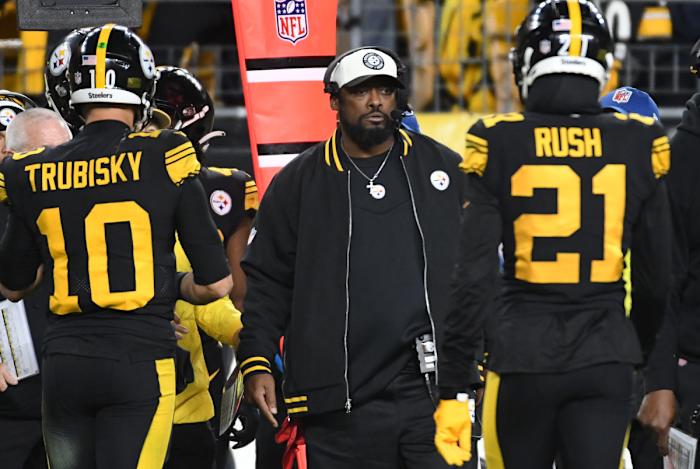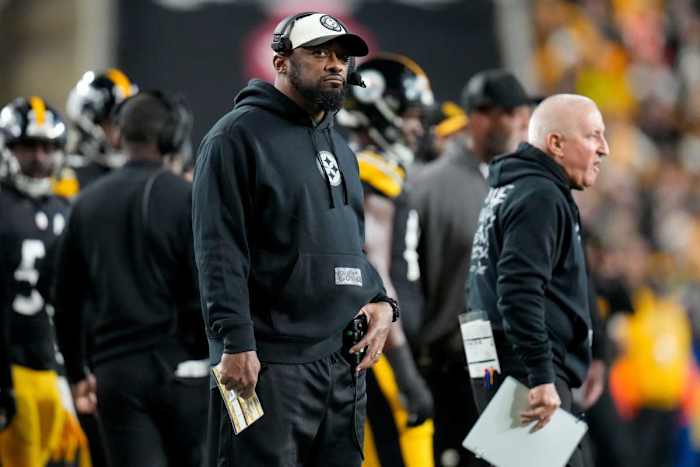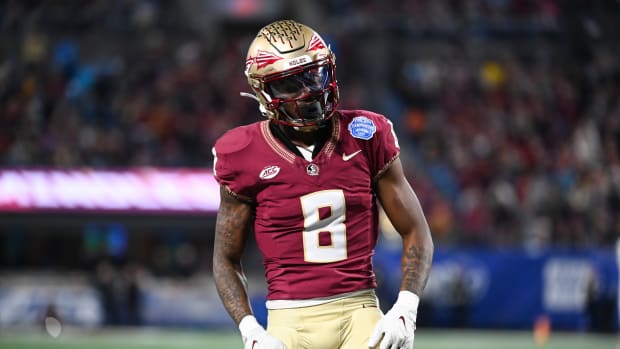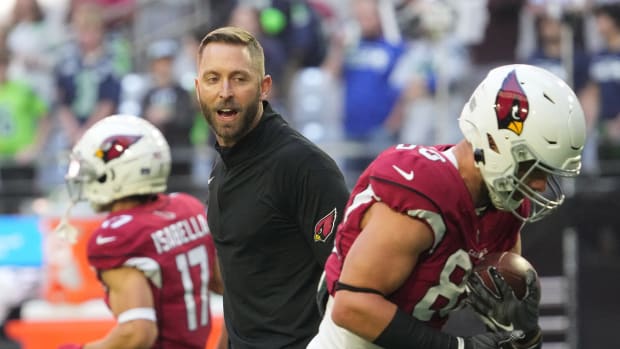Mike Tomlin’s Coaching Requires Context When Put Under Questioning
If you see Mike Tomlin simply as an NFL head coach, then, yes, he should have answered a question about having a year left on his contract with the Pittsburgh Steelers, or at least waited for the question to be asked before walking out of his postgame press conference after his team’s wild-card loss to the Buffalo Bills. But if you view him simply as an NFL head coach, you missed the point.
Tomlin is the most successful Black coach in the history of a sport with a deplorable record of hiring Black coaches. That comes with a burden and a responsibility that he did not request and cannot escape. Successful white coaches get to assume any criticism is just about their coaching. That is a perk of their privilege. Tomlin does not have that option.

Tomlin’s Steelers fell to the Bills, 31–17, in the wild-card round.
Philip G. Pavely/USA TODAY Sports
This particular question about having a year left on his contract was fair. But when judging Tomlin’s reaction, context is important. In 17 seasons, Tomlin has never had a losing record. In the two seasons since Ben Roethlisberger retired, the Steelers have started Kenny Pickett, Mason Rudolph and Mitchell Trubisky at quarterback. Tomlin’s winning percentage in those two seasons is virtually identical to Chuck Noll’s winning percentage in his career.
If all 32 NFL jobs opened tomorrow, and every coach was on the market, Tomlin would be one of the first half-dozen coaches to get a job.
Yet this season, Roethlisberger criticized the Steelers’ “bad coaching” on his podcast, adding “maybe the tradition of the Pittsburgh Steelers is done.” The “bad coaching” line was in regard to a specific game situation, not a general comment on Tomlin’s competence, but it surely helped inflame a fan base growing restless.
In the past, the most famous Steeler of all, Terry Bradshaw, said Tomlin is “not my kind of coach” and called him “a great cheerleader guy.” Bradshaw left out the fact that when he played for Noll, Noll was not his kind of coach. A great cheerleader guy? The insinuation was that Tomlin brings energy but doesn’t really know football. If you coached in a league where white owners consistently pass over qualified Black coaches to hire white coaches, how would you take that?
NFL commissioner Roger Goodell has tried various strategies to improve his league’s hiring record, and he hasn’t succeeded yet. It’s a major problem; Goodell has said so repeatedly. That is the backdrop of any conversation about any Black coach.
Tomlin has not explicitly said he is held to a racial double standard. The blowback would be fierce, and his words would surely get twisted. But he has hinted at it.
Three years ago, when there were rumors that Tomlin might want the USC job, he seemed offended. The implication was similar to Bradshaw’s: Rather than match strategies with Bill Belichick and John Harbaugh, Tomlin—who had not held a college job in 21 years—should drop down to a lower level.
“I mean, that’s a joke to me,” Tomlin said then. “I got one of the best jobs in all of professional sport. Why would I have any interest in coaching college football? And that will be the last time I will address it.”
Tomlin has spoken of his frustration with the NFL’s lack of Black head coaches. When Brian Flores sued the league for racial discrimination, Tomlin was the one who hired him. One of his reasons: “I didn’t want him to feel like he was on an island.”
When Tomlin was asked about his contract last summer, he said, “I’m just at the stage of my career where I don’t care about contracts, to be honest with you, man. I’m thankful that I’m at a stage in life and in my career that that’s a non-issue for me.”

Tomlin has taken the Steelers to the playoffs 11 times since becoming head coach.
Sam Greene/The Enquirer/USA TODAY Network
You can interpret that in a few ways. He doesn’t need the money. He is comfortable with his own ability. But calling it a “non-issue” may also have been Tomlin’s way of saying he didn’t need to worry about his contract, because he had reached the point where his job was secure no matter what the contract said. This was true, by the way. Steelers president Art Rooney II said last summer he wasn’t even worried about Tomlin’s contract, because he wanted Tomlin in Pittsburgh for a long time, and the team would extend Tomlin’s deal when the time came.
What possibly could have happened this season to change the Steelers’ view of Tomlin? He went 10–7 and made the playoffs with one of the worst quarterbacking situations of any team in the league. The Steelers lost three consecutive games down the stretch to bad teams, but they rallied to beat two teams with playoff hopes before beating a Baltimore Ravens team that rested starters.
Steelers receiver George Pickens did show a lack of effort against the Indianapolis Colts, but if that was the head coach’s fault, then who gets credit for Pickens responding with two of the best games of his career? Does any of it go to the head coach who managed to get Hall of Fame production from Antonio Brown without letting Brown destroy his culture?
Coaches get criticized. They get fired. It’s part of the business, and they all know it. Tomlin has fired coaches himself (most recently, offensive coordinator Matt Canada). But all Black coaches have asked for is to receive the same opportunities and be held to the same standards as their white counterparts. If the most successful Black coach in NFL history doesn’t get the respect he deserves, then how can Black assistants get the opportunities they deserve?
It is possible Tomlin is so tired of the speculation and criticism in Pittsburgh that he wants to go elsewhere, and it is possible that he just wants to shut it down and keep coaching the Steelers. I don’t know. But if Tomlin senses a racial bias in the conversation about him, then hundreds of Black coaches would tell you: He is their kind of coach.






































